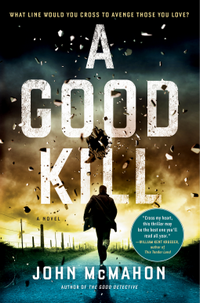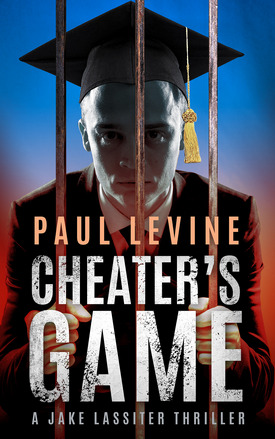I wasn’t able to finish my post about John McMahon’s A Good Kill in time for this morning, but I wanted to get something up about the book today. Thankfully, McMahon had taken part in the Q&A with me over the weekend. I really enjoyed his answers to this, and hope you do, too. Even more, I hope this Q&A makes you curious about the book, which is absolutely worth your time. Before we get to the his As and my Qs, here’s a little about the book:
 In the years since the unsolved deaths of his wife and son, Detective P.T. Marsh of Mason Falls, Georgia, has faced demons professional and personal. But when he is called to the scene of an unfolding crime and secures a clean look at an active shooter, the professional and personal become intertwined…and the consequences are shattering.
In the years since the unsolved deaths of his wife and son, Detective P.T. Marsh of Mason Falls, Georgia, has faced demons professional and personal. But when he is called to the scene of an unfolding crime and secures a clean look at an active shooter, the professional and personal become intertwined…and the consequences are shattering.
As Marsh and his partner Remy investigate the shooting, they confront confounding questions—and their search for answers leads them to a conspiracy at the highest levels of local government. The stakes in the case become increasingly high, culminating in a showdown that has Marsh questioning everything he knows…and wondering if some secrets are better left undiscovered.
At some point in time you decide that the instigating event for this book is going to be a school shooting—easily one of the most divisive things in the country. What led you to that pick? How do you go about researching that to make it authentic? How often did you regret that choice?
You’re 100% right to say that it’s a touchy subject, and for good reason. There’s been so many devastating active shooter events, at schools and other locations in the last two decades. But I think as you read the book, you see that the subject is not entered into divisively or politically.
In terms of the research, there was a playbook for how police handled this situation for years. Now that’s changed multiple times, most notably after Columbine. So unfortunately we’re living in an age where police manuals are available, as well as a lot of minute-by-minute reporting on the subject. Both those helped with authenticity.
There are elements of this novel that have their roots in (I assume, as this is my first encounter with your work) in the first novel. Had you been planning to keep this story going this long initially? How do you juggle the need to plant seeds to develop this slowly while keeping the readers of Books 1 and 2 engaged and keeping newcomers from feeling lost?
The three books are definitely a trilogy in my head, and certain storylines are one and two books long—while others last three books. But you’re right—it’s a juggling act.
I think it’s incumbent on the author to re-introduce key elements and characters in each book, so someone can join the hunt wherever they find a book. But you don’t want to bog it down for existing readers. Also, as you said, I’m planting seeds and laying long leads for future stories, past this book. I think part of the key is to leave some details unknown even to the author. Trust the subconscious.
I think of the three novels—#1 and #3 are the easiest to pick up and simply read as a stand-alone. So the optimal read starts with THE GOOD DETECTIVE—goes to THE EVIL MEN DO – and continues now with A GOOD KILL. That said, I’ve realized that readers will find book #2 first, then read #1. In my acknowledgments, I’ve invited readers to reach out, and a lot have emailed me they had no issues reading backwards, from two to one.
I loved Purvis—both in choosing to give Marsh a dog, and the choice of/characterization of this particular dog. Is there a real-life model for him? What are the downsides of having a character like him?
When I was writing book one, THE GOOD DETECTIVE… at some point, Purvis was in the back of P.T. Marsh’s F-150. I was writing the first 50 pages and Purvis just suddenly blurted out something. Like aloud.
I think in the first draft the bulldog said “So this is how we’re dealing with this shit, huh? For real?” As a writer I thought—am I crazy? Does P.T. have a talking dog? This is moody stuff I’m writing. Not a Disney movie. But surprisingly it worked. Purvis is sort of P.T.’s conscience in a lot of ways. Plus, he was technically not originally P.T.’s dog. He belonged to Jonas, P.T.’s son (who passed before the time of the first book). So Purvis is also a window into that old life and time period.
But in Book #3, A GOOD KILL, another dog is introduced, called Beau. This one has a real-life model: my own five-year-old Huskie retriever mix, Tessie. You might say they’re identical.
It’s Release Week for A Good Kill. How nervous are you? How’s it compare to the previous novels?
Where I get nervous is—will people discover the book? I had about 10 test readers on this one, through the final edits and into the final manuscript. Many were writers. Some were big time authors I’ve met in the last two years. And everyone was loving the book. But… that doesn’t mean readers will find it.
Book #2 came out last March, and there were a lot more pressing things going on in the world in March 2020. I was literally on tour on a Tuesday with fans in Houston, and the following day the world shut down. That was hard and hurt discovery of the book. So about three times as many people read #1 than #2. It’s understandable given the pandemic, but book discovery is a challenge for new authors. Avid readers are following 6 or 7 series, and they’re not physically browsing stores like they used to. So getting your work out there is a challenge. I’ve been featured in The NY Times “Top 10 Crime Novels of the Year” the last two years, and that’s helped tremendously.
For this book, I’m really excited to have people read it. The story in A GOOD KILL poured out of me faster than anything I’d written. Also, because of the pandemic, I had extra time to do a full re-write. I think it’s my strongest book, so I am excited to hear what readers think.
There’s a game we play around here, called “Online Bookstore Algorithm”. What are 3-5 books whose readers may like A Good Kill?
That’s a fun game. I think people who like these books would love A GOOD KILL:
- Michael Connelly, THE DROP.
- James Lee Burke, HEAVEN’S PRISONERS.
- Brian Panowich, BULL MOUNTAIN.
I think the Panowich book would hit the algorithm for characters, the Connelly book for plot and police procedural, and James Lee Burke, for setting, although my settings/descriptions are not as thick as Burke’s. I should add that the above 3 are some of my favorite writers, so this could be a dream algorithm too.
What’s next for John McMahon, author?
I’ve been working for ten months on a new stand-alone. It’s not set in Mason Falls, Georgia, and P.T. Marsh is not in the story. It’s a high-concept FBI ensemble book, and I cannot wait for people to read it. Because it’s a new world and I want to get it right, I’ve decided to add 6-8 months to my writing timetable. My agent has read a partial, thinks the book feels big and reads like a T.V. show. So fingers crossed.
(Post note: The main character’s nickname in the stand-alone is “H.C.” Can’t say more than that now but funny coincidence)
Clearly, this main character is a person of wisdom and taste—can’t wait to meet them.
Thanks for your time—and thanks for A Good Kill. I’m really enjoying it, and hope you have plenty of success with it.
I also want to thank Wiley Saichek and Saichek Publicity for arranging this Q&A and bringing the novel to my attention.





